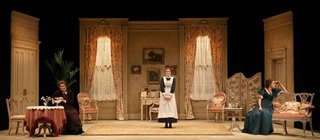The term a ‘Boston marriage’ was coined at the tail end of the nineteenth-century, after Henry James’ novel The Bostonians, to refer to the arrangement whereby two ladies lived together on independent means or with careers of their own in preference to a life of subservience to a male master. As part of The Gate Theatre’s season of plays within the Dublin Theatre Festival, ‘The Relish of Language’, which also features plays by Samuel Beckett and Harold Pinter, David Mamet’s Boston Marriage makes great play on the renowned stylistic prolixity and wordiness of Henry James as well as taking full advantage of and giving a very modern turn of affairs to the space of innuendo that existed in this all-female relationship and intimacy.
Boston Marriage subverts the theatrical conventions of the nineteenth century drawing-room drama, yet Mamet’s 1999 Victorian period piece is first and foremost a comedy, unashamedly and unadulteratedly so. Anna (Fiona Bell), whose lavish means and lush lifestyle are derived from the oldest profession of them all, with the extravagant generosity of one client in particular, excitedly welcomes back her younger live-in partner Claire (Justine Mitchell) after a brief absence only to be rebuffed by the news that the latter has fallen in love with a very young girl. The new, nubile and innocent object of desire is, in turn, on her way to Anna’s den of iniquity, apparently accompanied by her mother, even as Claire pleads, harangues and hassles Anna to occupy the mother and allow Claire to use her boudoir to seduce her new oh so youthful love.
An epic verbal contest and tug-of-love ensues between Anna and Claire, one that is full of barb and counter-barb, incrimination and bitter-sweet recollections; these Mametean knives are sharpened by some delicious twists in the tale. However, what entertains is that the battle is suffused in irony and conducted with the help of a cornucopia of lexical pyrotechnics which sees Mamet imitate and mock both the extravagant wordiness of certain types of Victorian literature and drama and the veneer of respectability, restraint and good manners so suffocatingly present in these same genres of that time. Thus, very often we are treated in one moment to dazzling, linguistically ornate complex and sophisticated interchanges between Anna and Claire, enunciated with relish and subtlety, only in the next instance to see them both drop the veil of drawing room urbanity and deliver the verbal equivalent of a kick in the privates in gloriously colourful argot and the kind of poetry of ordinary speech we more usually associate with Mamet.
 Into this duel of the chaise-longue strumpets, Mamet introduces the Maid, played by Anna Sheils-McNamee (making her debut at The Gate.) This allows Mamet to have more fun by subverting the role of servants in nineteenth-century literature. The Maid is Scottish but Anna continually insists on mistaking her as Irish and launches into hilarious tirades on the unscientific sentimentalisation of The Potato Famine in Ireland. It should be pointed out, though, that Boston Marriage conducts its subversions within a conventional structure. This ‘conventionality’ is reinforced by Eileen Diss’ iconic and archetypical Victorian drawing room set design and costumes by Joan O’Clery.
Into this duel of the chaise-longue strumpets, Mamet introduces the Maid, played by Anna Sheils-McNamee (making her debut at The Gate.) This allows Mamet to have more fun by subverting the role of servants in nineteenth-century literature. The Maid is Scottish but Anna continually insists on mistaking her as Irish and launches into hilarious tirades on the unscientific sentimentalisation of The Potato Famine in Ireland. It should be pointed out, though, that Boston Marriage conducts its subversions within a conventional structure. This ‘conventionality’ is reinforced by Eileen Diss’ iconic and archetypical Victorian drawing room set design and costumes by Joan O’Clery.
As with all of Mamet’s drama, crucial to Boston Marriage’s successful staging is razor sharp action and reaction, and knife-edge verbal exchange and interchange. Apart from one or two moments of the briefest of clutter in the triad of Anna-Maid-Claire, director Aoife Spillane-Hinks (also making her debut at The Gate) does an excellent job in elucidating serrated and high energy performances from Fiona Bell and Justine Mitchell, who masterfully (mistressfully) combine their cut-and-thrust dialogue with a convincing and virtually erotic joy and thrill of language; Anna Sheils-McNamee brings an added contorted comedic value to the Maid via an excellent Scottish accent, understated physicality and an ability to switch in her role from conventional subservience to reckless Machiavellianism.
Given that The Gate Theatre’s mini festival is called ‘The Relish of Language’, it’s entirely appropriate that the real star of Boston Marriage is David Mamet’s writing and words. It’s a measure of the success of this particular production that even as the fine cast charm us and make us laugh and bring great personality to bear on proceedings, what their virtuoso performances highlight most of all is the dizzying and dazzling poetry of Mamet's dialogue.
Patrick Brennan was chief theatre critic and arts writer with the Irish Examiner from 1990-2004. He is currently writing a book on the theatre of Tom Murphy.